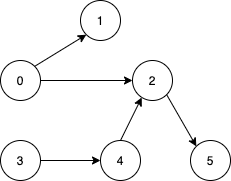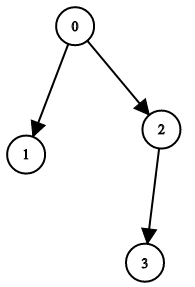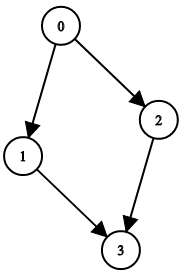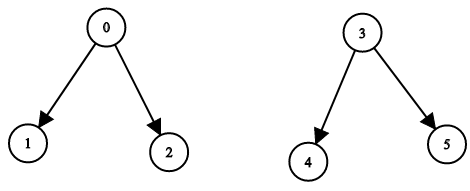Given a directed acyclic graph, with n vertices numbered from 0 to n-1, and an array edges where edges[i] = [fromi, toi] represents a directed edge from node fromi to node toi.
Find the smallest set of vertices from which all nodes in the graph are reachable. It’s guaranteed that a unique solution exists.
Notice that you can return the vertices in any order.
Example 1:

Input: n = 6, edges = [[0,1],[0,2],[2,5],[3,4],[4,2]] Output: [0,3] Explanation: It's not possible to reach all the nodes from a single vertex. From 0 we can reach [0,1,2,5]. From 3 we can reach [3,4,2,5]. So we output [0,3].
Example 2:

Input: n = 5, edges = [[0,1],[2,1],[3,1],[1,4],[2,4]] Output: [0,2,3] Explanation: Notice that vertices 0, 3 and 2 are not reachable from any other node, so we must include them. Also any of these vertices can reach nodes 1 and 4.
Constraints:
2 <= n <= 10^51 <= edges.length <= min(10^5, n * (n - 1) / 2)edges[i].length == 20 <= fromi, toi < n- All pairs
(fromi, toi)are distinct.
Solution: In degree
Nodes with 0 in degree will be the answer.
Time complexity: O(E+V)
Space complexity: O(V)
C++
|
1 2 3 4 5 6 7 8 9 10 11 |
class Solution { public: vector<int> findSmallestSetOfVertices(int n, vector<vector<int>>& edges) { vector<int> in(n); for (const auto& e : edges) ++in[e[1]]; vector<int> ans; for (int i = 0; i < n; ++i) if (in[i] == 0) ans.push_back(i); return ans; } }; |



